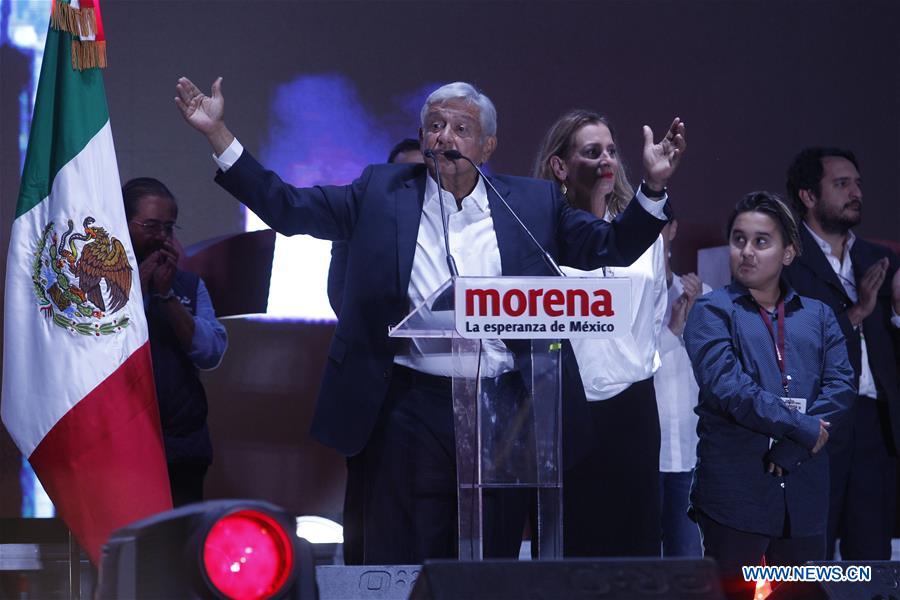Victory for the left in Mexico
- By Heiko Khoo and Michael Roberts
 0 Comment(s)
0 Comment(s) Print
Print E-mail China.org.cn, July 11, 2018
E-mail China.org.cn, July 11, 2018

Andrés Manuel López Obrador scored a crushing victory in Mexico's presidential election. Held on July1, the country's 88 million voters gave AMLO over 53 percentof the vote. His campaign tapped into deep-seated anger about the economy, inequality and corruption.
Back in 2006, Mexico's presidential elections were rigged in order to thwart AMLO's bid. But this time around, the sheer scale of his support prevented a repetition of this tactic. AMLO's party, called "Morena," formed in 2014, now holds a majority in the Mexican Congress. However, it is in an alliance with a small Christian fundamentalist party, and they will demand "moderation" of AMLO's policies, particularly on social and "family" questions.
AMLO's campaign focused on three key issues: rising violence, inequality, and endemic corruption among politicians and officials. He promised to launch a war to end corruption, to support the right to recall officials, and to jettison many of the trappings of wealth associated with presidential office.
Violence certainly seems to be spiraling out of control. The 29,168 killings since last September, included 130 politicians and 48 candidates for office. The homicide rate is mainly attributable to drug cartels and gangs, score settling among criminals, and weak law enforcement. Corruption is endemic, and vast scandals have engulfed prominent politicians under the incumbent President Enrique Peña Nieto. In addition, the kidnapping and murder of 43 students in the Mexican state of Guerrero has outraged the nation.
Only post-apartheid South Africa surpasses Mexico's level of inequality. However, at the root of all the violence, corruption and inequality, lies the economy. Mexico's GDP is the 2nd largest in Latin America and 15th in the world, but its economy is in a feeble state.
Inequality between the rich and poor is exacerbated by uneven development, while the cumulative economic growth in the best-performing Mexican states reached 32 percent between 2007 and 2016, about double the average for Latin America, this is about four times the rate of growth in poorly performing states. Per capita output shows the same diverging path. In Oaxaca and Chiapas about 70 percent of the population lives in poverty and over 23 percent in extreme poverty.
The 1994 NAFTA trade deal with the U.S.and Canada failed to take the Mexican economy forward.Whereas Mexico's economy more than doubled in size to reach 16 percent of U.S. output in the 30 years prior to the mid-1980s, it has declined to 12 percent thereafter. Now Mexico's output per hour worked relative to that of the U.S. is close to its lowest level since 1950.
Indeed, NAFTA increased Mexico's dependence on U.S. trade and investment, as it locked-in the neo-liberal measures of the 1980s. This exacerbated existing disparities between the U.S. border area and the rural areas. Now, President Trump would like to make bilateral economic relations even more favorable to the U.S.
If Mexico's pre-1980 growth rate had continued, it would now count as a high-income country, its people richer than the Portuguese or the Greeks. In these circumstances, the pressures on the poor driving them to migrate would have eased. However, since joining NAFTA in 1994, real wages stagnated. In 2014, they barely stood at the level of 1980, and from 1994 to 2015, the minimum wage fell by 19.3 percent in real terms. In 2014 Mexico's poverty rate of 55.1 percent was higher than in 1994, an increase of 20.5 million people.
Low profitability and investment, and the impact of NAFTA, caused the Mexican economy to stagnate. From the early 1980s, pro-business governments had stemmed the fall in the profitability of Mexican capital to some extent, but most other capitalist economies faired better.
Slow growth following the 2008 global crash led to a crisis in public finances, as the state picked-up the bill for private sector failure. Public debt grew from 21 percent of GDP in 2008 to 45.4 percent of GDP in 2018. Servicing this debt absorbs 20 percent more government revenue than that allotted for health, education and poverty reduction in the federal budget. This is the burden that AMLO will inherit. The profitability of Mexican capital is still some 18 percent below the level of 2007 and 28 percent below the 1997 "neo-liberal" peak.
Often described as a firebrand populist for his socialist rhetoric and militancy, AMLO has moderated his language recently. AMLO's program is based on Keynesian ideas i.e., using public investment to "prime the pump" of private investment. He envisages that the money saved by reducing corruption will deliver the required funding.
However, AMLO will struggle to contain corruption, and reduce inequality and violence, without taking control over the banks and clashing with the interests of major multi-national companies.
Donald Trump's apparent determination to unleash a global trade war puts Mexico on the front line. So, when AMLO becomes Mexico's president in December, he will face huge challenges. Nevertheless, with a large and young population, significant oil and gas resources, and some advanced industry, AMLO's victory could serve to reignite socialist visions for Latin America.
Heiko Khoo is a columnist with China.org.cn.
For more information please visit:http://china.org.cn/opinion/heikokhoo.htm
Michael Roberts is a London based Marxist economist. He published the "The Great Recession" in 2008 and "Essays on Inequality" in 2014
Opinion articles reflect the views of their authors, not necessarily those of China.org.cn.






Go to Forum >>0 Comment(s)